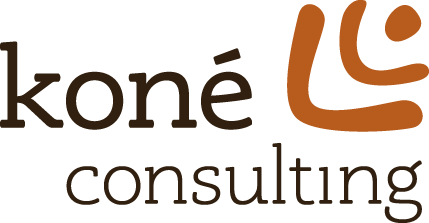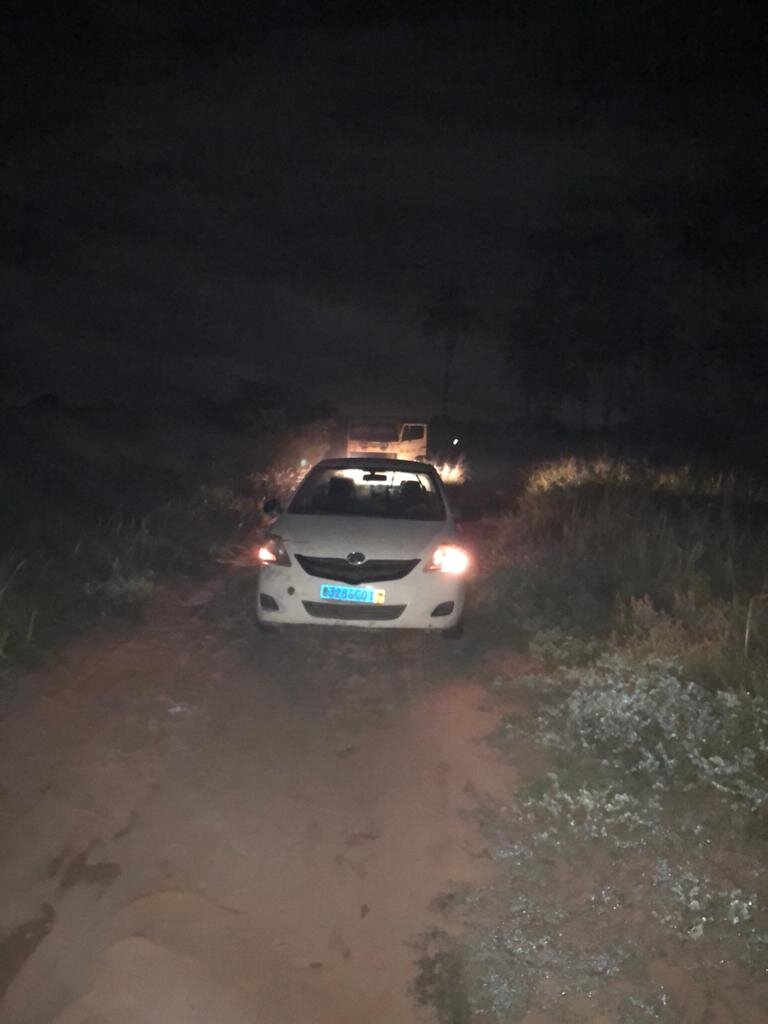Postcards from Côte d’Ivoire: Entry 4
Ou sont les pieds d’Alicia cette semaine?
(Where are Alicia’s feet this week?)
Monday, February 22, 2021
Wow - a whole week has elapsed since I last checked in with you from the center of Côte d’Ivoire (CI) in Bouaké. After leaving Bouaké we headed farther north to the subprefecture of Katiola to visit our friend Abbe (Father) Germaine and Habiba Koné (no relation) at the St. Genevieve Welcome Center for children who would otherwise have been victims of infanticide. We did make it to Katiola, and Sekou had a nice visit with Abbe and Habiba, but unfortunately, I got very sick with a chronic health condition I usually manage pretty well at home and we ended up limping back to Abidjan (ABJ) over two days in our Land Rover to give me opportunities to rest. We arrived back at our “chic and secure” apartment in ABJ on Wednesday morning and by Wednesday afternoon Sekou had secured the medication I needed from our local Pharmacie Bonne Fortune so I could start to heal up. The focus of my blog this week is transportation, by the way, not Alicia’s health - so hang on while I turn us to the topic of transporting goods and people here.
As sick as I felt, I felt sooooo privileged to have a personal vehicle (with working A/C!) and a very good driver (thanks, Sekou) to get me back to Abidjan. The rest of the WEL NGO team either took rougher personal transit (think old Toyota pick-up with one window that rolls down, maybe) or a private bus company called UTB that services the route to Bouaké that makes many stops and takes hours and hours longer. Transportation is one of CI’s greatest challenges. There are problems on the supply and demand sides of the market, and the problems are both with lack of passable roads and lack of good, reliable vehicles, and, in my personal opinion, a lack of good drivers. And, like most things, poverty and inequality in income and opportunities exponentially complicate getting transportation.
During a 10-year period at the beginning of the century, CI struggled with internal conflict and the government fell apart. No one was being held accountable to the citizens. Licensing vehicles, importation of vehicles and parts, the maintaining of roads, bridges and streetlights all just stopped happening or became rackets for bribery and extortion. So, since 2011 when peace was restored here through a democratic election, the government has been working hard to put regulation back in place, including a ban on the importation of any vehicle older than five years, and building infrastructure including 1,200 miles of new freeways and bridges to buckle a “belt” around the whole country. But like everything else they just can’t seem to build roads fast enough to keep up with the expanding population in the Abidjan area.
Air pollution was a big problem when I first visited in 2011 because there were no emissions regulations on vehicles. Diesel trucks and cars spewed black plumes of smoke while idling in freeway traffic. That first trip with Sekou and our three sons we relied on taxis to get around and we had to wear bandanas over our mouths to keep out the soot. Most of the cars on the road were no longer recognizable as their original make and model, but instead amalgamations of (most of) the necessary parts to make a working vehicle plus some unnecessary decorations. No wheel on a taxi has all of its lug nuts, for example. Why use 10-12 when two or three will keep the wheel on - until it falls off and then - as I once saw - the taxi driver just hops out, runs down the road after the tire, and puts it back on with two more lug nuts. And don’t even talk about driver’s licensing or CDLs or taxi licenses back then. All that has changed now, though. Everywhere we go there are checkpoints of police pulling over taxis and semi-trucks making sure they are properly licensed, and the vehicle has been inspected and registered, but there are a lot of cars on the road so it’s going to take time.
A taxi is a luxury for a lot of people here who are making about $200/month on average. Poor people walk or take another wonder of the modern African country - the “gbaka” (pronounced “baka”). A gbaka is a private ride-share service. Usually some kind of 14-passenger van that has been custom built and decorated. You can catch a ride on a gbaka pretty much wherever you need to go in Abidjan for 50 cents to a dollar U.S., but not even Sekou takes the gbaka anymore - he took me on one once just for the experience. It’s a little too primitive, mostly because the driver and the barker that fills the van like to FILL THE VAN. Usually 20+ people and cargo, including goats and chickens, are being transported in a very haphazard way. It’s comical to see, but unfortunately gbaka are a major safety problem. Many people die in accidents related to them each year. We just saw a bad gbaka accident on the freeway today, actually.
Another big luxury is having a Land Rover 4x4 with a powerful engine that can get around on the terrain, because Abidjan is built on sand and it gets a lot of rain. Rain and sand do not make for good roads. Even the newly paved roads eventually get covered with sand that gets dragged onto the streets when it rains and every day street sweeping crews come out and sweep the sand off the streets again. We especially rely on our 4x4 when we head out to the Jacqueville/Songon area where we are building our retirement snowbird home. It’s paved until the last 5 kilometers or so, and the road gets increasingly primitive the closer we get to our property. So, yesterday we were really feeling privileged to hop in our car and head out for an afternoon lakeside at Lac Labion. We had arranged for a pirogue ride around the lake so we can get to know the neighborhood a little. (What an amazing experience I will cover in an upcoming blog - the birds blew my mind!)
It was all going well until about 4 PM when it was cool enough for our ride so Sekou and our caretaker Koblan hopped in our car to find the pirogue driver and tell him we were ready. When they returned and Sekou turned off our car it made a very bad noise and then wouldn’t restart. Did I mention the heat, humidity and salt air here corrodes everything mechanical it touches? Well, that includes car parts and ours sits for about 10 months each year, so parts failure is not surprising. Sekou called his petit frere Moussa the Mechanic, who recommended we put some water in it and let it cool off while we enjoyed our pirogue ride and then call him back. We did, and the car still didn’t start, so Moussa and his bestie Ousmane hopped in a car and began making their way through Sunday evening traffic to try and get us going. Two hours later we heard they were getting close, and then nothing. Probably about the time I asked Sekou what kind of 4x4 Moussa would be driving, Moussa and Ousmane were getting their Toyota Yaris stuck on the first hill of our approach road…so they CARRIED a new battery the rest of the way to our property and established pretty much right away that either the starter or alternator or both needed to be replaced. Then they called a tow truck to come get them unstuck and pick up our car. This is getting long-winded, so I’ll hit the rest of the highpoints like this:
· Tow truck takes another two hours to arrive at the dirt road and then has to backtrack an hour to another route because they can’t make it up the hill either.
· Tow truck arrives to pick up our car in complete dark - loads with no incident .
· Tow truck retraces long route back to main road while Sekou and I walk in the dark to meet it - at this point it is 12:30 AM and we are navigating by half-moonlight.
· Tow truck attempts to back up our hill far enough to get winch to Yaris to pull it out of sand and tow truck gets stuck.
· Tow truck off-loads our vehicle and manages to get winch to Yaris and pull it out of sand.
· Tow truck is freed from sand using many men, palm fronds, and a tug from the Yaris, reloads our vehicle and takes off for Abidjan with Ousmane supervising the offload of the Land Rover at their lot.
· Sekou and I get in the Yaris with Moussa who gives us a ride home, but not without one final thrill because OF COURSE the Yaris had an empty gas tank…and thankfully (so this story ends) on the outskirts of Youpougon there was a 24/7 gas station that had gas. We got home at 2 AM.
The moral of the story? Reliable transportation is not a human right, but it sure makes life a lot easier. The definition of “reliable” is relative, though. We still made it home…just a little later than we planned because of a few complications in-between!? - Alicia
Koné Consulting
CELEBRATING 10 YEARS INSPIRING CHANGE
AND LASTING IMPROVEMENTS
Follow us on our Facebook, Twitter and LinkdIn.




